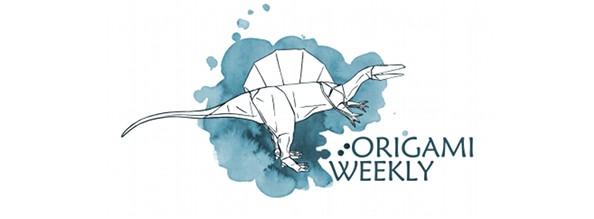For this week, we've got a nice, deceptively simple bowl from Philip (you might know him as oschene on Flickr). I say deceptively simple because although it's not to hard to fold, the math behind it is fascinating, and surprisingly complex, when it gets down to it. There's a division by sevenths in there, and even an allusion to a proof for the Pythagorean Theorem from an old Chinese mathematical text.
Diagrams available here.
Tuesday, March 31, 2009
Zhoubi Bowl, by Philip Chapman-Bell
Wednesday, March 25, 2009
Mask, by Joel Cooper
Week 12, and we're running out of time again-- this time around, a tessellated mask by Joel Cooper. We've all been impressed by Joel's work, but like most of the tessellation community, he doesn't post creasepatterns for his models. I understand why-- this took me eight hours to reverse-engineer, and another four hours to draw the CP. In fact, we ran out of time to finish folding it-- which is why you get this picture instead of a finished one folded from nicer paper.
CP here:
dl.getdropbox.com/u/232756/joelmask.pdf
CP (c) Andrew Hudson, design (c) Joel Cooper
Monday, March 16, 2009
Stars and Wheels, Andrew Hudson
Welcome back to week 11! I saw that we haven't posted a geometric model in a few weeks, so here's a diagram I've been working on for awhile. As far as I know, this is the first full diagram of the decreeping process, which I've worked with a lot through variations on Chris Palmer's Flower Tower. It's tricky, so hold tight and don't get too frustrated!
So here are the diagrams:
http://dl.getdropbox.com/u/232756/decreep.pdf
As usual, we'd love to see your interpretation of our diagrams. Please post pictures, or send them to us!
Monday, March 9, 2009
Wildebeest - Ryan Welsh
Wildebeest - Ryan Welsh
It's Week 10!
This may feel like a bit of a blast from the past. This week we have Ryan Welsh's Wildebeest, which appears to have a strong John Montroll influence. The design and diagrams were made back in the 90s! Yet even today it still looks nice!
The version above was folded by me, from an 8.5 inch square of bond paper, which was definitely not the best choice. I recommend a square of at least 8 inches, and definitely thinner/better for folding than printer paper.
As always, we would like to see any photos of Origami Weekly releases that you have folded. Don't hold back, show off your skills!
See you next week!
--Jared
Tuesday, March 3, 2009
Orchid Blossom, by Andrew Hudson
It's week 9 here at Origami Weekly, and we've got a brand-new diagram for you. So new, in fact, that it's a day late because I had to finish it! It's got curved-surfaces, a three-dimensional folding process, and lots of referencing... And the collapse is a bit of a puzzle too, hard to diagram but I did my best.
Here are the diagrams:
dl.getdropbox.com/u/232756/orchidblossom.pdf
(and for those of you that have to know, this was wetfolded using 80-lb drawing paper manufactured by Blick Art Materials)
